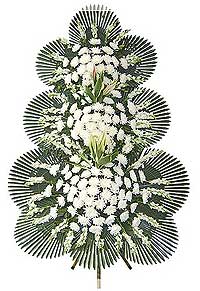Death, mourning and social status
 A funeral is a time of grief, reflection and reunion. For Koreans, it’s also considered an opportunity to display one’s status not unlike a German car or bag of Pings.
A funeral is a time of grief, reflection and reunion. For Koreans, it’s also considered an opportunity to display one’s status not unlike a German car or bag of Pings.
People will take the location of the funeral house, the size of the mourning room, the number of visitors flowing in to pay their respects and the flowers sent in condolence as indicators of the social and economic stature of the deceased and his or her family.
So those who can spend lavishly to commemorate the death of a family member and for this precise reason, funerals are a lucrative business for hospitals.
Most of the country’s big general hospitals operate funeral service facilities within the premises. The top-five hospitals — Samsung Medical Center, Asan Medical Center, Seoul National University Hospital, Severance Hospital and St. Mary’s Hospital — charge anywhere from 700,000 won to 3 million won per day depending on the size of the mourning room and the level of service provided.
Operating two large-sized general hospitals, one in the northern part and the other in the southern part of Seoul, Samsung offers three kinds of mourning rooms. The biggest one is capable of hosting 120 visitors at once and costs 2 million won per day. Mid-sized rooms are priced at 1.5 million won per day and the smallest ones run for 700,000 won per day.
Asan Medical Center provides more diverse choices, offering four kinds of mourning rooms that are priced between 750,000 won to 2.9 million won per day.
Renting the room is just one of the many items on the expense list for holding a funeral. Additional fees include the fee for the casket, proper suit and dress, flowers, funeral limousines and the food and beverages served to those that come to pay their respects.
Asan charges 15,000 won per guest for the food.
“The average family will spend between 10 million won to 15 million won (about $13,000) on a funeral, although of course, the spending levels vary dramatically from family to family,” said an official at the Asan hospital.
While funerals are expensive, Koreans have the custom of “bujo,” literally translated to mean “giving help,” where each mourner presents some money in an appropriate envelope to the family of the deceased to help cover costs.
The mourner writes his or her name on a white envelope as well as the relation with the person who has died. It is collected upon arriving at the entrance of the mourning room.
The amount of bujo given also reflects the social status of the giver. Although there are no rules set in stone, the average Korean will pay around 30,000 won to 100,000 won depending on relationship with the deceased. The sum skyrockets when members of the political and business elite are involved, reflecting once more their status while alive.
There has been increasing uneasiness over the appropriateness of the bujo custom, as often high-profile social figures politely declaring the acceptance of bujo recently. Democratic United Party lawmaker Won Hye-young donated 100 million won he received in bujo after the memorial service of his late mother to welfare centers in 2009. <The Korea Times/Kim Jae-won>



















































